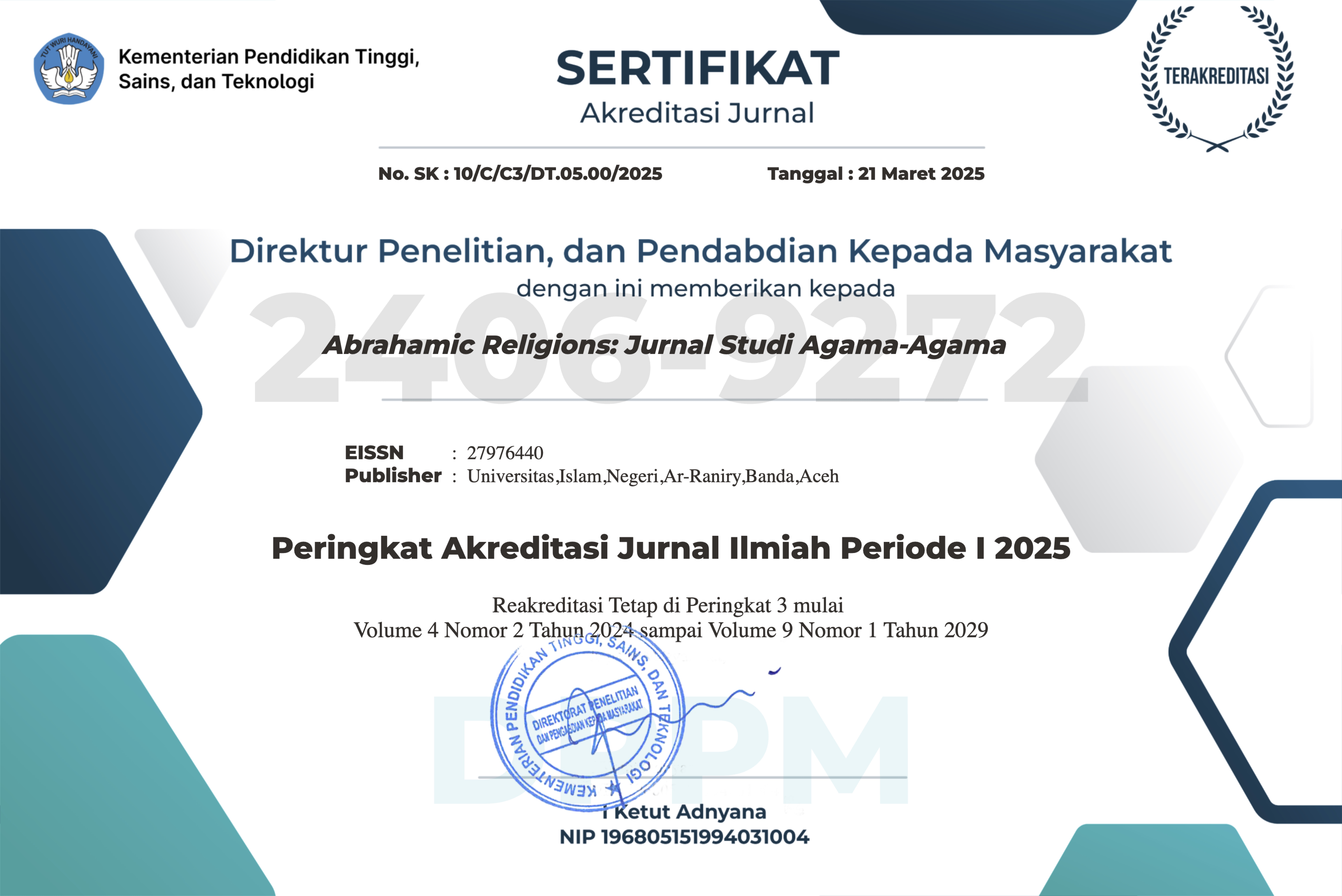Ecological Spirituality Catechesis Based on Shared Christian Praxis for Catholic Youth in Southeast Aceh
DOI:
https://doi.org/10.22373/arj.v5i2.31827Keywords:
Catechesis, Ecological Spiritual, Catholic Faith, SCP, Young CatholicsAbstract
Faced with the deforestation crisis in Southeast Aceh, with the rate of forest loss reaching ±5,000 hectares/year based on KLHK data in 2024, and the phenomenon of ecological faith dissociation among Catholic Youth (OMK), this research develops an ecological catechesis model based on Shared Christian Praxis (SCP). This model is designed to transform OMK into agents of environmental conservation while overcoming the limitations of conventional catechesis, which is monologic and abstract. By applying Martin Heidegger's (1962) hermeneutic phenomenological method, data were collected through in-depth interviews (31 OMK and 14 community and church leaders), participatory observation of ecological catechesis and reforestation activities, and document study in Southeast Aceh (April-June 2025). The findings prove that (1) the SCP model succeeded in increasing the ecological awareness of 72% of OMK participants through spiritual transformation that interpreted “planting trees as a liturgy of life”; (2) the integration of Laudato Si' teachings with the local wisdom of Adat bak Poe Teumeureuhom strengthened context-based ecological identity; and (3) real action commitments were manifested in reforestation participation (80%) and reduction of single-use plastics (65%). Key recommendations include the adoption of an integrated catechesis module, the church and government, and advocacy for an “ecological refugee” policy based on the Vatican document (POCDP). Theologically, this research affirms the ecological crisis as a path of holiness while making a significant contribution to the development of practical theology, particularly in building a participatory, contextual, and action-oriented ecological catechesis paradigm as a manifestation of authentic faith.
References
DIKPLHD, D. L. H. K. A. T. (2024). Buku I Dokumen Informasi Kinjera Pengelolaan Lingkungan Hidup Daerah.
Ginting, B. K. (2022). Dimensi Spiritualitas Ekologis Kalender Tradisional Karo. 21(1), 35–50.
Global Forest Watch. (2024). Tree cover gain in Indonesia compared to other areas. Global Forest Watch.
Groome, T. H. (1980). Cristian Religius Education. Harper & Row.
Heidegger, M. (1962). Being and Time Terj. John Macquarrie & Edward Robinson. In New York. Blackwell Publishers Ltd. I 08 Cowley Road Oxford OX4 IJF, UK.
John W. Creswell. (2015). Penelitian Kualitatif & Desain Riset Memilih di antara Lima Pendekatan (EDISI KE-3) (!aifuddin .Zuhri Quf;y (ed.)). Pustaka Pelajar.
Kompas, K. 24 J. 2019. (2019). Hutan Aceh Terus Menyusut. Kementerian Lingkungan Hidup Dan Kehutanan.
Kristiantoro, S. (2022). Spiritualitas Ekologis Abad Pertengahan dan Implikasinya bagi Pemeliharaan Lingkungan Masa Kini. SOLA GRATIA: Jurnal Teologi Biblika Dan Praktika, 3(1), 40–61. https://doi.org/10.47596/sg.v3i1.184
KWI, K. (2019). Orang Muda, Iman, dan Penegasan Panggilan Dokumen Akhir dari Sidang Umum Biasa XV Sinode Para Uskup. MC, Sr. Caroline Nugroho (B. H. T. P. Andreas Suparman SCJ (ed.); Vol. 107, Issue 1). Departemen Dokumentasi dan Penerangan KWI.
Manen, M. Van. (1997). Researching lived experience. In second edition (Ed.), Researching lived experience. Routledge; Taylor & Francis Group-London and New York.
Maria Veronika. (2019). Katekese Model Scp (Shared Christian Praxis) Dalam Pembinaan Iman Remaja Katolik Di Paroki St. Maria Assumpta Tanjung, Ketapang Kalimantan Barat.
Munawar-Rachman, B. (2024). Dialog Agama dan Ekologi. Jurnal Peradaban, 4(1), 1–19. https://doi.org/10.51353/jpb.v4i1.1001
Ollerenshaw, J. A., & Creswell, J. W. (2002). Narrative Research: A Comparison of Two Restorying Data Analysis Approaches. Qualitative Inquiry, 8(3), 329–347. https://doi.org/10.1177/10778004008003008
Paus Fransiskus. (2015). Laudato Si. Ensiklik Paus Fransiskus, 1–161.
Resfina, D. (2020). Sosialisasi Ekologi Teologi Bagi Jemaat Gksi Immanuel Bagi Penghijauan Di Kecematan Kuala Behe. Jurnal PKM Setiadharma, 1(2), 13–19. https://doi.org/10.47457/jps.v1i2.57
Sibarani, A. (2020). Media Sosial Sebagai Konteks Pendidikan Kristiani Kontekstual Bagi Generasi Millennial. Majalah Ilmiah METHODA, 10(1), 1–8. https://doi.org/10.46880/methoda.v10i1.516
Susanto, G. A. (2025). Forum Praksis Bahas Laudato Si’ dan Krisis Pengungsian Akibat Bencana Ekologis. In Sesawi.Net dan Inigoway.Com (p. 3). Sesawi.Net dan Inigoway.Com.
Tibo, P. P. H. B. T. C. F. (2024). Katekese Moderasi Beragama (O. S. Lumban Tobing (ed.)). Tangguh Denara Jaya.
Waeng, A. E., & Castello, A. J. De. (2025). Implementasi Peran Umat Manusia Merawat Bumi yang Terluka dalam Perspektif Ensiklik Laudato Si. Jurnal Apostolicum: Jurnal Pendidikan Keagamaan Katolik Ledalero, 01(01), 143–158.
Zuhri, N. (2019). Penebangan Hutan di Aceh Sepanjang Tahun 2018 Menurun. KumparanNews, 1.
Downloads
Published
Issue
Section
License
Copyright (c) 2025 Bere Paulus Halek, Margareth Santa Hutabarat Santa Hutabarat, Elisabeth Endang Br Sitorus Endang Br Sitorus, Bima Salomo Silalahi

This work is licensed under a Creative Commons Attribution-ShareAlike 4.0 International License.
Authors who publish in this Journal agree to the following terms:
- Authors retain copyright and grant the journal right of first publication with the work simultaneously licensed under Attribution-ShareAlike 4.0 International (CC BY-SA 4.0) allows others to share the work with an acknowledgment of the work's authorship and initial publication in this journal.
- Authors are able to enter into separate, additional contractual arrangements for the non-exclusive distribution of the journal's published version of the work (e.g., post it to an institutional repository or publish it in a book), with an acknowledgment of its initial publication in this journal.
- Authors are permitted and encouraged to post their work online (e.g., in institutional repositories or on their website) prior to and during the submission process, as it can lead to productive exchanges, as well as earlier and greater citation of published work. (See The Effect of Open Acces)















